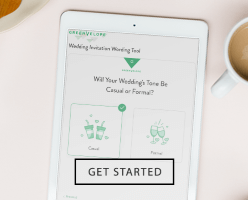7 Types of Weddings to Consider for Your Big Day

Planning a wedding is an exciting journey filled with anticipation and lots of decisions. One of the first and most important choices you’ll have to make is what type of wedding you envision for your big day.
Whether you’re drawn to a traditional ceremony, an intimate small wedding, a themed extravaganza, or an extended wedding weekend, the perfect one depends on your budget, personal preferences, and style.
Here, we’ll explore seven options and discuss how each type of wedding impacts the planning process. We’ll also help you find matching invitations once. Ready to turn your vision into an unforgettable celebration of your love?
Different Types of Weddings: 7 Main Options

The types of weddings are different from wedding themes — though we’ll touch on those here as well. Rather than focusing on style or decor, the “type” of wedding refers more to the event’s structure. This includes elements like the ceremony, reception, traditions, and overall size, which can differ for each one.
Keep reading to discover the seven main types of weddings. We’ve also included curated invitation ideas to help you find a design that perfectly complements your celebration.
1. Traditional Weddings

Design: Claudia Owen
Matching Invitation: Lace Letterpress Invitation
A traditional wedding (also called a classic wedding) is ideal for couples who’d like to incorporate religious and cultural elements into their special day. These nuptials are formal or black-tie affairs, and the bride typically wears a white wedding dress. Bridesmaids and groomsmen usually accompany the happy couple as part of the wedding party.
A traditional wedding follows the classic format of a wedding ceremony, cocktail hour (during which the wedding party takes professional photos), and a wedding reception. The ceremony may occur at a church or a formal location, while the reception usually involves a three-course sit-down dinner.
Traditional weddings also often include rituals like toasts and speeches during or after dinner and a cake-cutting ceremony. There’s usually a first dance featuring the newlyweds plus dances for the father of the bride and his daughter and the mother of and groom with her son.
For planning, traditional etiquette would suggest that the bride’s family pay for the wedding. If you’re following this tradition, the groom’s family contributes by paying for the rehearsal dinner the night before and for any entertainment and legal fees (e.g., the marriage license).
Remember, it’s your wedding — you can adhere to traditional etiquette or do things your way!
2. Elopements

Design: See That There
Matching Invitation: Free-Spirited Watercolors Invitation
For couples who want to say “I do” in private — or spontaneously — an elopement is the perfect way to keep things intimate. In an elopement ceremony, the couple exchanges vows and ties the knot in front of an officiant, either at the city hall or a unique location. They can keep it simple or add a few family members and closest friends to the big day.
Elopements are generally simple and affordable affairs. The couple takes center stage and can choose a special elopement location like a national park, remote mountaintop, or deserted beach. The format is also simple, usually involving the ceremony and followed by a small meal like a brunch or lunch.
Planning an elopement is quick and easy since you don’t need to worry about wedding planners or guest counts. You’ll need to plan ahead if your elopement involves jetting off to a private island or unique destination, though.
3. Small Weddings

Design: Raven Erebus
Matching Invitation: Summer Cotton Invitation
A small wedding follows the traditions of a classic wedding but on a much smaller scale. Instead of inviting hundreds of guests, small weddings focus on asking only close friends and family to attend. Most small weddings usually have 20 to 50 guests, while the smaller microwedding has less than 20.
The benefit of these intimate weddings is that you can spend time individually with each guest. You’ll also have more wedding venue options since most places can host a group of 20 to 50 people. You can also splurge on things like flowers or your dream wedding dress since you won’t have to allocate as much of your budget to costs like food and beverages.
The biggest planning consideration for a small wedding is your guest list since you might need to whittle it down. Avoid hurting anyone’s feelings by being clear about your intentions or including anyone who didn’t make the list in a post-wedding reception party later.
4. Religious Weddings

Design: Signature Greenvelope
Matching Invitation: Simply Stars Invitation
Religious weddings come in many forms to reflect different traditions, but they typically occur in a house of worship and adhere to strict guidelines. Depending on the religion, this may mean that it differs from the traditional wedding outlined at the beginning of this section.
For example, there may be specific rituals like draping the couple with a shawl while they say their vows, performing handfasting ceremonies, or rules for who walks them down the aisle.
Religious weddings are easy to plan since they’re guided by many rules. You can work with your church’s wedding planning department or a secular professional wedding planner. Talk to the clergy to review rules and expectations for payments or donations before the wedding day.
You may also need to clearly understand the dress code and who’s allowed to attend — some churches only allow members of the congregation to be present during the ceremony.
5. Destination Weddings

Design: National Park Foundation
Matching Invitation: Yosemite Invitation
Destination weddings open up tons of options for couples who want to tie the know in a unique locale. You might opt for an upscale vineyard in California’s Napa Valley, a castle in the south of France, or an eco-lodge in Bali.
If this sounds like your dream wedding, you’ll need to do some extra planning. Working with a local wedding planner makes organizing easier since they’re there in person and can help if you need someone who speaks the local language.
You’ll also want to consider how to handle your destination wedding invites. They’ll need to be sent further in advance so guests can buy flights, book hotels, and get visas.
You might invite close family and friends to the fairytale wedding at your dream location. Large weddings abroad often cost more overseas, so many couples typically host a bigger reception with more guests back home.
6. Themed Weddings

Design: Sarah Deters Illustration
Matching Invitation: Boho Disco Invitation
Who doesn’t love a themed event? A themed wedding is a fun way to showcase your personalities and vibe as a couple. It also makes it easier to plan decorations and choose wedding invitations since you’ll be choosing everything to match your style and theme.
Themed weddings can range from laid-back and casual to over-the-top and whimsical. Some of the most popular wedding themes include:
- Beach weddings
- Glamorous weddings
- Outdoor weddings
- Rustic weddings
- Vintage weddings
- Boho weddings
- Minimalist weddings
- Garden weddings
7. Weekend Weddings

Design: Becky Nimoy Stationery
Matching Invitation: Italian Street Invitation
If the perfect wedding means spending more than just one day with your loved ones, consider turning it into a weekend-long celebration. This type of wedding is ideal for couples that love entertaining and want to spend as much time celebrating as possible.
Wedding weekends start with a welcome dinner, game, cocktail hour, and rehearsal dinner (if needed). The next day is usually the wedding ceremony, followed by dinner and dancing late into the night. The final day typically includes a farewell brunch or a longer celebration, depending on the location and guest travel plans.
Wedding weekends are more complicated to plan because you aren’t just scoping out one day. Instead, you’re making plans for two or three days. This is where a wedding planner can help alleviate some of the stress.
Wedding weekends can also cost significantly more than other types of weddings. Be sure to use a budget tracker or spreadsheet to tally up your costs and keep a close eye on your budget.
Find Invitations to Match Your Wedding Type

With these types of weddings, you can find the format that fits your budget and personality — whether you prefer something intimate and affordable or grandiose and unforgettable. Once you’ve chosen one, use Greenvelope to find digital invitations to match any type of wedding or theme.
We have thousands of designs from formal and elegant to laid-back and fun. You can fully customize each one to make it perfect for your big day.
For more wedding planning advice, continue browsing our Stationers blog. You’ll find ideas for wedding themes and etiquette, plus inspiration from real weddings to make your day extra special.



